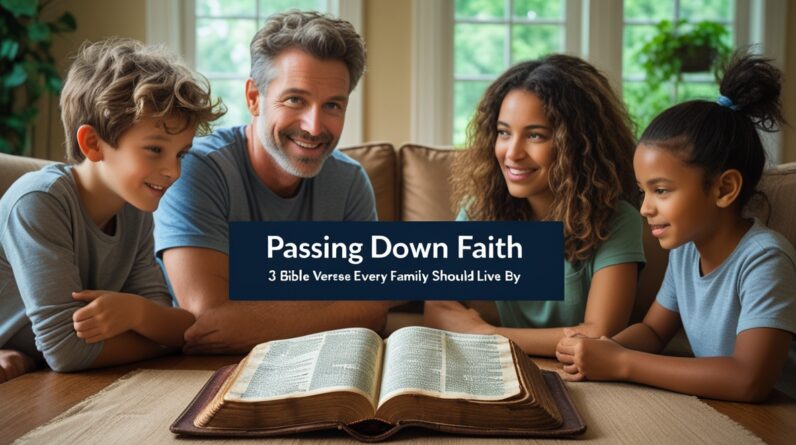God’s Promise To Be Faithful Through Generations
You probably feel the weight of legacy. You want your faith, values, and trust in God to outlast you. That longing is biblical. The Bible reassures you that God’s character spans time and that His faithfulness touches families, communities, and nations. When you read scripture like Psalm 100:5 and Deuteronomy 7:9, you see a steady promise: God is faithful, and His faithfulness is generational.
What the Scriptures Say About God’s Faithfulness
When you study the Bible, a clear theme emerges: God keeps His promises. He doesn’t change, and His commitment to His people doesn’t fade with time. For example, the psalmist declares that “the LORD is good” and “his faithfulness continues through all generations” in Psalm 100:5. The apostolic teaching and the Old Testament both affirm that God’s reliability is a foundation for hope.
As you meditate on scripture, consider how God’s faithfulness serves as an anchor in seasons of uncertainty. His promises are not merely for the moment; they are promises you can build your life and your family legacy upon. That is the heart of God’s promises revealed through generations.
Deuteronomy 7:9 — A Covenant That Endures
God’s covenantal language is vital to understanding this promise. In Deuteronomy 7:9, Moses tells Israel that God is faithful to keep the covenant of love to a thousand generations of those who love Him and keep His commands. That is not casual language. You need to see it as a binding assurance: God’s promise to generations is rooted in His covenant love.
When you read this verse, visualize continuity: fathers and mothers, grandparents and grandchildren, all touched by a steadfast God. The promise is generational, not because of human merit but because of God’s unchanging commitment. That should give you hope as you pray for children, plan for future ministry, or simply desire to model faith at home.
Psalm 100:5 — The Character of God That Lasts
Psalm 100 is a short but profound call to worship. Verse 5 tells you why worship matters: “For the LORD is good and his love endures forever; his faithfulness continues through all generations” (Psalm 100:5). Here you find two pillars—God’s goodness and God’s faithfulness—which combine to sustain generations.
This truth changes how you live. If God’s faithfulness continues through all generations, then your spiritual disciplines, your family investments, and your acts of obedience are not wasted. They are part of a larger story that God is writing across time.
How God’s Promise to Generations Shows Up in Scripture
To help you grasp this, think of biblical examples where God’s promise stretches across generations. Abraham’s promise in Genesis 17:7 shows a covenant that extends to descendants: “I will establish my covenant between me and you and your descendants after you.” David’s line is an example of God keeping a promise through turbulent history. And ultimately, the promise culminates in the person and work of Jesus, who secures eternal life for many generations (see Hebrews 13:8).
Each of these passages points to the same reality: God’s promise to generations is not theoretical. It’s enacted through salvation history, covenant relationships, and the life of Christ.
Why This Promise Matters to You Today
You might ask, “How does an ancient promise affect my life?” The answer: profoundly. When you grasp God’s promise to generations, it affects your identity, your hope, and your priorities. You know you’re part of a story bigger than your own life. Your choices influence future faith. Your prayers, sacrifices, and obedience can echo into eternity.
You also gain courage. Faithfulness in your daily life—teaching your children, serving your church, showing mercy—takes on eternal significance when you remember that God’s promises span generations. That’s why you should invest in spiritual habits and relational rhythms that transmit faith.
Obstacles to Receiving and Passing On the Promise
Even with the promise clear, some obstacles can prevent you from experiencing its full blessings. Some of these obstacles include neglect, generational sin, complacency, and cultural pressures. If you ignore spiritual formation, you risk breaking the chain of blessing. If you allow bitterness or unresolved conflict to take root, it can hinder the promise’s expression in your family.
Recognizing barriers is not for guilt but for action. When you identify what gets in the way—poor communication, lack of discipleship, or inconsistent spiritual leadership—you can address it with intention. God’s promise to generations invites your cooperation, not passive hope.

Practical Ways to Live Out the Promise in Your Home
You want tangible steps. The Bible gives you practical rhythms that pass faith from one generation to the next. These include prayer, scripture reading, family worship, serving together, and intentional conversations about faith. When you create simple, repeatable spiritual practices, children and grandchildren absorb faith as a way of life.
Start with these manageable steps:
- Pray daily for your family’s spiritual health.
- Read a short scripture passage at mealtimes or bedtime.
- Share your testimony and stories of God’s faithfulness.
- Serve others together so faith is expressed through action.
These practices, small as they may seem, activate God’s promise to generations by creating spiritual soil where faith can grow and be passed on.
The Role of the Local Church in Generational Faithfulness
You don’t carry this alone. The local church is God’s ordained community for nurturing spiritual formation across generations. A healthy church equips parents, provides discipleship for youth, and models intergenerational relationships. When your church prioritizes family ministry, mentorship, and community care, it multiplies the impact of God’s promise to generations.
Ask your church leaders how they are intentionally building relationships between seniors and young people. Encourage programs that pair experienced believers with younger families. Your involvement in a church that embodies generational faithfulness amplifies the promise.
Stories of Generational Faith — Real-Life Encouragement
Stories help you see the promise in action. Consider a grandmother who prayed for decades for a prodigal grandchild, and one day that grandchild chose faith. Or think about a small family that began weekly Bible time and later saw their children volunteer for missions. These stories are not rare; they are the common fruit of persistent faith applied over time.
When you hear testimony after testimony, you realize the power of persistence. God’s promise to generations often moves through ordinary people living an obedient, steadfast life. Your story could be next.
Teaching Your Children the Faith Without Pressure
You want your children to embrace faith, but you also don’t want to force them. The Bible models patient teaching—consistent modeling with gentle invitation. Share your faith naturally: tell them what God means to you, invite them to church and serve alongside them, and answer their questions with honesty.
Cultivate curiosity rather than coercion. When your child sees a life of joy, peace, and purpose grounded in faith, they’re more likely to ask about it for themselves. God’s promise to generations often takes shape when faith is presented as a faithful invitation rather than an ultimatum.
Addressing Doubts and Questions Across Generations
Doubt is part of faith’s growth. Your children, your friends, and even you will wrestle with questions. When doubts arise, meet them with humility, Scripture, and community. Use resources—Books, podcasts, trusted mentors, and clear Bible teaching—to help navigate tough questions.
Your response to doubt models how future generations will handle their own questions. Be honest: you don’t have all the answers, but you trust a God whose promises endure. That kind of authenticity fosters genuine faith and honors God’s promise to generations.
The Power of Repentance and Restoration
Sometimes generational patterns include brokenness—addiction, patterns of abuse, or spiritual neglect. The good news is that God’s promise to generations includes the possibility of healing. Scripture calls you to repentance and restoration. When you humble yourself, seek forgiveness, and pursue reconciliation, you break destructive cycles and open the door for God’s renewing work.
Your willingness to admit failure and seek God models courage for younger family members. Restoration is proof that God’s faithfulness is not limited by human failure; it overcomes it.
Generational Blessings and the Responsibility of Stewardship
God’s promises often include both blessing and responsibility. As beneficiaries of God’s faithfulness, you have stewardship responsibilities: to care for your family spiritually, to be faithful stewards of resources, and to invest time in discipleship. Stewardship is not merely financial; it is about how you use your influence, time, and gifts to forward God’s kingdom across generations.
Ask yourself: What am I doing today that will bless the next generation? Your daily choices—time spent reading scripture, mentorship, generosity—become the means by which God’s promise to generations is realized.
Cultural Challenges and How to Respond
You live in a culture that often pulls in competing directions. Secularism, individualism, and moral confusion make passing faith to the next generation harder. But God’s promise to generations is not negated by culture. Instead, it calls you to be salt and light—consistent, loving, and winsome in witness.
Respond to cultural pressure with clarity and compassion. Teach your children how to engage culture with truth and grace. Equip them to think biblically and to show Christ-like character in their schools, workplaces, and friendships.
Faith Amid Hardship: When Promises Feel Distant
There are seasons when God’s promises seem distant—loss, sickness, or unanswered prayer can make you wonder if God is faithful. In these seasons, return to the testimony of scripture and the community of believers. Psalm 100 and Deuteronomy 7 remind you that God’s character is fixed even when your circumstances are not.
Rely on community: let others pray with you, and allow the church to carry you when your faith is weak. God’s promise to generations often becomes most visible when communities of faith stand together through hardship.

Practical Plan: How to Intentionally Pass on Faith
You need a plan—something actionable you can start today. Here’s a practical, simple plan to help you pass on faith to the next generation without overwhelm:
- Begin with a prayer for your family’s spiritual future.
- Establish a short weekly family devotion time.
- Tell stories of God’s faithfulness from your life.
- Serve together in a ministry or community project.
- Initiate one-on-one conversations with younger family members about faith and questions.
This step-by-step approach helps you activate God’s promise to generations through consistent, repeatable actions.
Mentorship: Investing in the Next Generation Outside Your Home
Not every generational transfer happens within biological families. Mentoring young people in your church or community is a powerful way to extend God’s faithfulness beyond your household. When you invest in a young adult or teenager, you become a conduit for God’s promises to continue.
Mentorship doesn’t need to be complicated. Start by listening, praying, and offering practical guidance. Your time could be exactly what a younger person needs to anchor their faith for decades to come.
The Global Perspective: God’s Promise Across Nations
God’s promise isn’t limited by boundaries. God’s faithfulness moves across languages, cultures, and continents. Mission work, diaspora communities, and global partnerships all showcase how generational faith can flourish beyond local contexts. When you think globally, your stewardship expands: you can pray for missionaries, support global ministries, and engage with global narratives of faith.
God’s promise to generations is an invitation to participate in what God is doing worldwide—bringing transforming hope to families everywhere.
Theologically Grounded Hope: Why You Can Trust the Promise
You may wonder on what basis you can trust God’s promise to generations. It’s rooted in God’s nature—His immutability, His covenant love, and His work in Christ. Hebrews and the prophets testify that God does what He says. For example, the assurance of Christ’s constancy in Hebrews 13:8 echoes this: Jesus Christ is the same yesterday, today, and forever.
Your certainty comes not from human effort but from divine fidelity. That theological ground gives you confidence to live and invest in long-term faithfulness.
Worship as the Engine of Generational Faith
Worship is more than singing; it shapes identity. When your family and church prioritize worship—adoration, confession, thanksgiving—you form a spiritual DNA that can be passed on. Worship communicates God’s character to the next generation and roots them in a reality bigger than themselves.
Make worship a regular, relational practice. Through worship, God’s promise to generations gets embedded in heart and memory.
Practical Resources to Help You
You don’t have to invent everything. There are resources—devotionals, family worship guides, and Bible reading plans—that can help you structure generational faith practices. Use short devotions suited to different ages, and get books that tell stories of faith across generations.
Select resources that are Scripture-focused and easy to implement. The right resource can catalyze consistent practice and open conversations about God’s faithfulness.
A Prayer for Generations
Pray with purpose: ask God to make you faithful, to bless your family, and to enable you to live in ways that point to Him. Pray for a legacy of faith that outlives your life. When you pray, you align your heart with God’s promise and invite His power into your family story.
Here’s a simple prayer you can use: “Lord, I thank You for Your faithfulness. Help me to be faithful in raising the next generation. Use my life to communicate Your love and truth so that my children and grandchildren may know You. In Jesus’ name, Amen.”
Conclusion: Live with Eternal Perspective
You have been given a promise that stretches beyond your lifetime. When you embrace God’s promise to generations, your everyday choices gain eternal weight. Model faith, teach diligently, and invest prayerfully. The God who promised is faithful, and He is working in ways you may not yet see.
Keep persevering. Keep praying. Keep teaching. The generations behind you and ahead of you will be shaped by what you do now.
Explore More
For further reading and encouragement, check out these posts:
👉 7 Bible Verses About Faith in Hard Times
👉 Job’s Faith: What We Can Learn From His Trials
👉 How To Trust God When Everything Falls Apart
👉 Why God Allows Suffering – A Biblical Perspective
👉 Faith Over Fear: How To Stand Strong In Uncertain Seasons
👉 How To Encourage Someone Struggling With Their Faith
👉 5 Prayers for Strength When You’re Feeling Weak

📘 Jesus and the Woman Caught in Adultery – Grace and Mercy Over Judgement
A powerful retelling of John 8:1-11. This book brings to life the depth of forgiveness, mercy, and God’s unwavering love.
👉 Check it now on Amazon
As a ClickBank & Amazon Affiliate, I earn from qualifying purchases.
Acknowledgment: All Bible verses referenced in this article were accessed via Bible Gateway (or Bible Hub).
“Want to explore more? Check out our latest post on Why Jesus? and discover the life-changing truth of the Gospel!”








